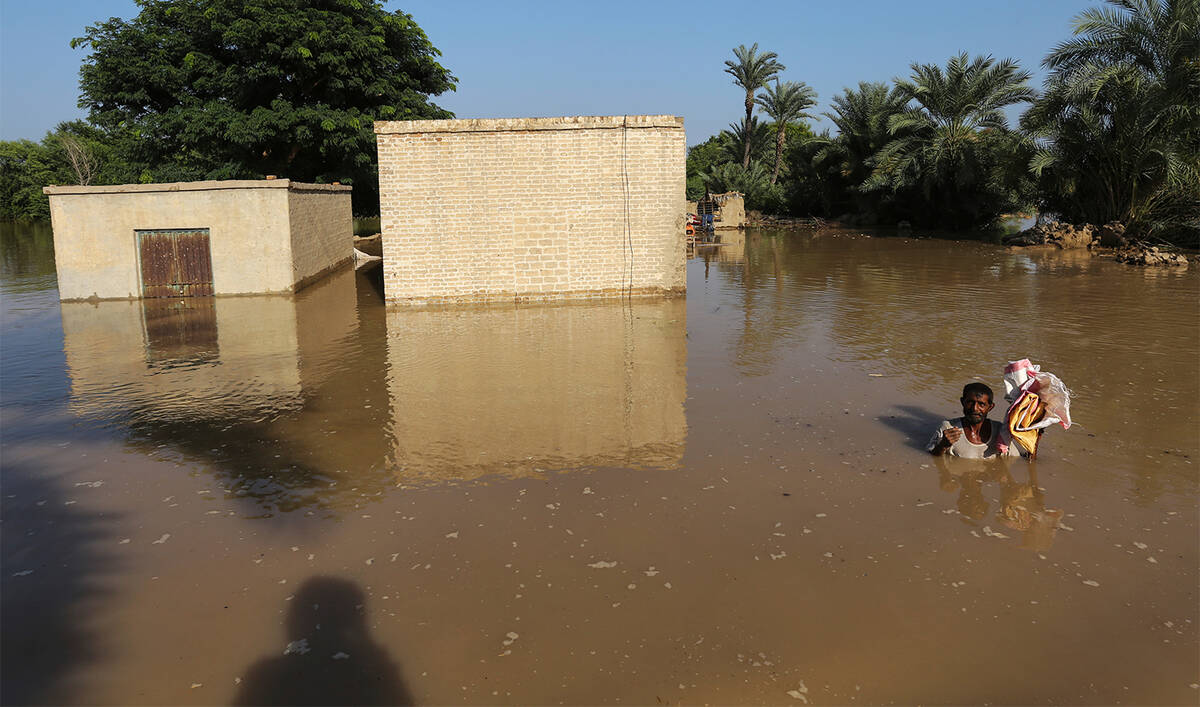KARACHI/ISLAMABAD: Pakistan on Wednesday declared a climate emergency and an agricultural emergency as weeks of monsoon flooding swept through multiple provinces and swelled southern river systems, threatening major crops and forcing mass rescues in Karachi, the countryŌĆÖs largest city and financial hub.
Nationwide, the National Disaster Management Authority (NDMA) said on Tuesday 928 people have died in floods, rains and related incidents since June 26, when the monsoon season began. Thousands more have been injured and millions displaced.
Punjab province, PakistanŌĆÖs most populous and its main farming belt, has borne the brunt of the latest monsoon spell which started late August, with the Provincial Disaster Management Authority (PDMA) reporting 66 deaths, 21 million people displaced or evacuated, and around 1.95 million acres of farmland inundated after weeks of record rains that have swelled the Chenab, Ravi and Sutlej rivers.
ŌĆ£The floods have caused a lot of destruction,ŌĆØ Prime Minister Shehbaz Sharif told a cabinet meeting in Islamabad on Wednesday. ŌĆ£Today, after the consultation, the cabinet is announcing a climate emergency and an agricultural emergency.ŌĆØ
Sharif said the government would form a high-level committee led by Planning Minister Ahsan Iqbal, bringing together federal ministers, senior bureaucrats and the chief secretaries of all four provinces to coordinate relief and recovery. He added that an apex-level meeting with provincial chief ministers would also be convened to shape policy.
While the federal government would ŌĆ£do its part,ŌĆØ he stressed, the provinces must contribute as well:
ŌĆ£Only together can we reduce this damage.ŌĆØ
The prime ministerŌĆÖs announcement came as the Pakistan Business Forum (PBF) had already urged authorities to declare an agricultural emergency, warning that the floods had destroyed up to 60 percent of the rice crop and badly damaged sugarcane and cotton. The group said national output targets for rice, maize, sugarcane and cotton were now ŌĆ£in jeopardy,ŌĆØ with the country possibly forced to import as much as 5 million tons of wheat to stabilize prices.
A preliminary PBF assessment put crop losses at 60 percent of rice, 30 percent of sugarcane and 35 percent of cotton, with farmland damage spread across PunjabŌĆÖs key divisions including Faisalabad, Bahawalpur and Sahiwal. Ahmad Jawad, the groupŌĆÖs chief organizer, said the disaster could shave 0.8 percent off GDP this year.
Brokerage firm Arif Habib revised down its growth forecast to 3.2 percent, estimating agriculture losses of Rs302 billion ($1.0 billion), nearly three-fourths of the total Rs409 billion ($1.4 billion) flood damages.
The brokerage also warned of import pressures of nearly $1.93 billion in fiscal 2026, including more than 700,000 tons of cotton imports costing over $1 billion, and said inflation could rise to 7.2 percent from earlier estimates of 5.5 percent as shortages push up food prices.
SINDH RISKS
Floodwaters from PunjabŌĆÖs swollen rivers are now coursing south into Sindh province through the Indus, raising the risk of further inundation in riverine communities and major towns.
Authorities at the Guddu Barrage in upper Sindh reported more than 500,000 cusecs of water flowing through on Wednesday, underscoring the threat to downstream districts.
In Karachi, the provincial capital of Sindh province, more than 300 people have been rescued after hours-long downpours inundated low-lying areas this week, according to SindhŌĆÖs disaster authority on Wednesday.
ŌĆ£So far, 325 people have been rescued,ŌĆØ Sindh PDMA Director General Salman Shah said.
A local charity reported two deaths after a van was swept into a stream, and Sindh Chief Minister Murad Ali Shah told reporters that four people were killed in Malir during the night. He said people were rescued from a truck near the Malir River in the morning.
Fresh rainfall readings on Wednesday showed 31.5 millimeters in the upscale Defense Housing Authority neighborhood, 18 millimeters at an air force base in the cityŌĆÖs west, 15 millimeters in the port district of Keamari, and over 13 millimeters in northern suburbs
Rescue 1122, a government emergency service, said evacuations were carried out in several flooded neighborhoods including Surjani, Abdul Rahim Goth and Saadi Town. SindhŌĆÖs chief minister toured affected areas with senior ministers, urging citizens to follow government safety instructions.
The National Disaster Management Authority warned of more rain over the next 24ŌĆō48 hours in parts of Sindh, including Karachi, Hyderabad and Sukkur, and in neighboring Balochistan province, with risks of urban flooding, traffic disruptions and flash floods in mountain valleys.
Officials urged residents to avoid unnecessary travel, keep vehicles in safe areas and stay clear of submerged roads and underpasses.
RIVERS
In its latest report on river flows at 130pm on Wednesday, PunjabŌĆÖs disaster authority reported heavy flows across the eastern tributaries of the Indus River. The Chenab was carrying 250,005 cusecs at Trimmu Headworks near Jhang, while on the Ravi the highest volumes were 100,622 cusecs at Sidhnai Headworks downstream of Multan.
On the Sutlej, flows peaked at 530,152 cusecs at Punjnad Headworks, where the river joins the Indus. Farther south, gauges on the Indus recorded 493,281 cusecs at Guddu Barrage in Sindh.
The Sindh chief minister said the province had prepared for flows of up to 900,000 cusecs, and that more than 500,000 cusecs had already reached Guddu Barrage on the Indus.
ŌĆ£We have established relief camps where people will come, and health camps where more than 5,000 people have been treated,ŌĆØ he said in a statement, adding that over one million livestock had been vaccinated.
With inputs from Ismail Dilawar in Karachi

















